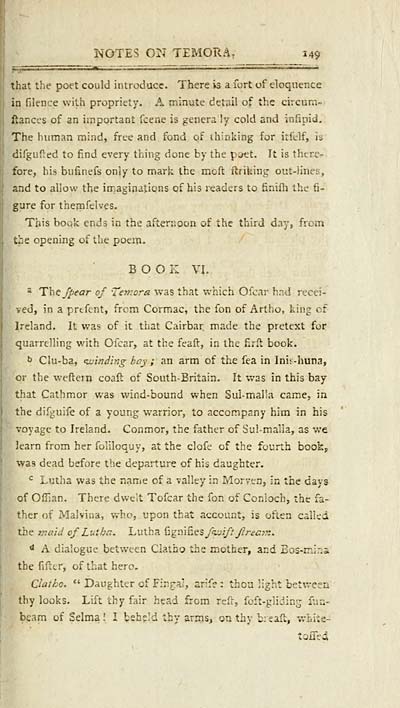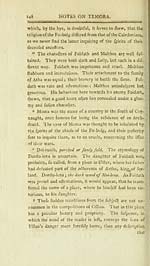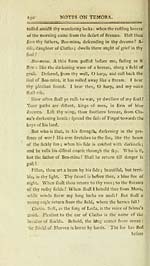Download files
Complete book:
Individual page:
Thumbnail gallery: Grid view | List view

NOTES ON TEMORA, 149
that the poet could introduce. There is a fort of eloquence
in fileiice with propriety, A minute det;iil of the circuni-
ftances of an important fcene is genera I y cold and infipid.
The human mind, free and fond of thinking for itfelf, is
difguded to find every thing done by the poet. It is there-
fore, his bufinefs only to mark the mcft ftriking out-lines,
and to allow the imaginations of his readers to finifli the fi-
gure for themfelves.
This book ends in the afternoon of the third day, from
the opening of the poem.
BOOK VI.
* 'X\\t Jpear of \en:ora was that which Ofcar hnd recei-
ved, in a prcfent, from Cormac, the fon of Artho, king of
Ireland. It was of it that Cairbar made the pretext for
quarrelling with Ofcar, at the feaft, in the firft book.
b Clu-ba, cMtnding bay ; an arm of the fea in Inis-huna,
or the weftern coaft of South-Britain. It was in this bay
that Cathmor was wind-bound when Sul-malla came, in
the difguife of a young warrior, to accompany him in his
voyage to Ireland. Conmor, the father of Sul-malla, as we
learn from her foliloquy, at the clofe of the fourth book,
was dead before the departure of his daughter.
'^ Lutha was the name of a valley in Morven, in the days
of Oflian. There dweit Tofcar the fon of Conioch, the fa-
ther of Malvina, who, upon that account, is often called
the tnaid of Lutha. Lutha iignix^esfrjjiftjirec?::.
^ A dialogue between Clatbo the mother, and Bos-ir.ir.s.
the fifter, of that hero.
Clatho. " Daughter of FiDgal, arife : thou light between
thy looks. Lift thy fair head from reft, foft-gliding fun-
bcim of Selma! I fceh°!d thy arms, outhyb;eafi, white-
t3iTi-i
that the poet could introduce. There is a fort of eloquence
in fileiice with propriety, A minute det;iil of the circuni-
ftances of an important fcene is genera I y cold and infipid.
The human mind, free and fond of thinking for itfelf, is
difguded to find every thing done by the poet. It is there-
fore, his bufinefs only to mark the mcft ftriking out-lines,
and to allow the imaginations of his readers to finifli the fi-
gure for themfelves.
This book ends in the afternoon of the third day, from
the opening of the poem.
BOOK VI.
* 'X\\t Jpear of \en:ora was that which Ofcar hnd recei-
ved, in a prcfent, from Cormac, the fon of Artho, king of
Ireland. It was of it that Cairbar made the pretext for
quarrelling with Ofcar, at the feaft, in the firft book.
b Clu-ba, cMtnding bay ; an arm of the fea in Inis-huna,
or the weftern coaft of South-Britain. It was in this bay
that Cathmor was wind-bound when Sul-malla came, in
the difguife of a young warrior, to accompany him in his
voyage to Ireland. Conmor, the father of Sul-malla, as we
learn from her foliloquy, at the clofe of the fourth book,
was dead before the departure of his daughter.
'^ Lutha was the name of a valley in Morven, in the days
of Oflian. There dweit Tofcar the fon of Conioch, the fa-
ther of Malvina, who, upon that account, is often called
the tnaid of Lutha. Lutha iignix^esfrjjiftjirec?::.
^ A dialogue between Clatbo the mother, and Bos-ir.ir.s.
the fifter, of that hero.
Clatho. " Daughter of FiDgal, arife : thou light between
thy looks. Lift thy fair head from reft, foft-gliding fun-
bcim of Selma! I fceh°!d thy arms, outhyb;eafi, white-
t3iTi-i
Set display mode to: Large image | Transcription
Images and transcriptions on this page, including medium image downloads, may be used under the Creative Commons Attribution 4.0 International Licence unless otherwise stated. ![]()
| Early Gaelic Book Collections > Ossian Collection > Morison's edition of the Poems of Ossian, the son of Fingal > (523) |
|---|
| Permanent URL | https://digital.nls.uk/77722105 |
|---|
| Description | Selected books from the Ossian Collection of 327 volumes, originally assembled by J. Norman Methven of Perth. Different editions and translations of James MacPherson's epic poem 'Ossian', some with a map of the 'Kingdom of Connor'. Also secondary material relating to Ossianic poetry and the Ossian controversy. |
|---|
| Description | Selected items from five 'Special and Named Printed Collections'. Includes books in Gaelic and other Celtic languages, works about the Gaels, their languages, literature, culture and history. |
|---|

